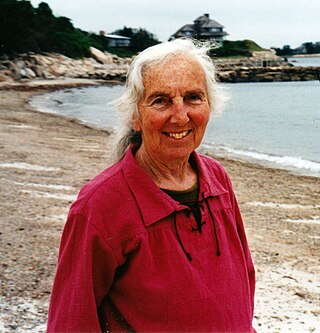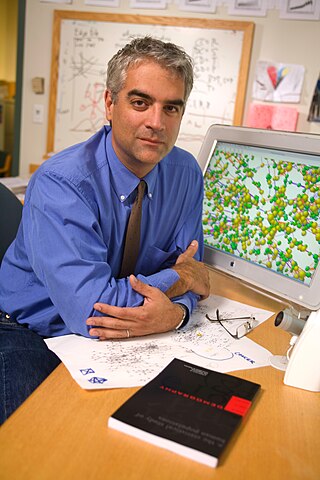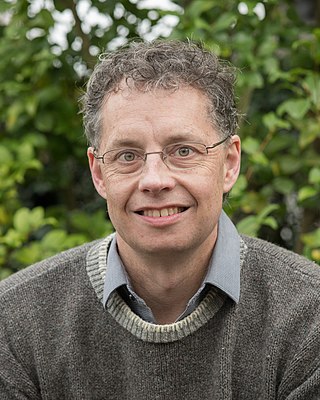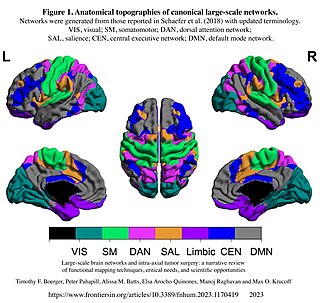Related Research Articles
A complex system is a system composed of many components which may interact with each other. Examples of complex systems are Earth's global climate, organisms, the human brain, infrastructure such as power grid, transportation or communication systems, complex software and electronic systems, social and economic organizations, an ecosystem, a living cell, and, ultimately, for some authors, the entire universe.

Proceedings of the National Academy of Sciences of the United States of America is a peer-reviewed multidisciplinary scientific journal. It is the official journal of the National Academy of Sciences, published since 1915, and publishes original research, scientific reviews, commentaries, and letters. According to Journal Citation Reports, the journal has a 2022 impact factor of 11.1. PNAS is the second most cited scientific journal, with more than 1.9 million cumulative citations from 2008 to 2018. In the mass media, PNAS has been described variously as "prestigious", "sedate", "renowned" and "high impact".
"Publish or perish" is an aphorism describing the pressure to publish academic work in order to succeed in an academic career. Such institutional pressure is generally strongest at research universities. Some researchers have identified the publish or perish environment as a contributing factor to the replication crisis.
Citation impact or citation rate is a measure of how many times an academic journal article or book or author is cited by other articles, books or authors. Citation counts are interpreted as measures of the impact or influence of academic work and have given rise to the field of bibliometrics or scientometrics, specializing in the study of patterns of academic impact through citation analysis. The importance of journals can be measured by the average citation rate, the ratio of number of citations to number articles published within a given time period and in a given index, such as the journal impact factor or the citescore. It is used by academic institutions in decisions about academic tenure, promotion and hiring, and hence also used by authors in deciding which journal to publish in. Citation-like measures are also used in other fields that do ranking, such as Google's PageRank algorithm, software metrics, college and university rankings, and business performance indicators.
The h-index is an author-level metric that measures both the productivity and citation impact of the publications, initially used for an individual scientist or scholar. The h-index correlates with success indicators such as winning the Nobel Prize, being accepted for research fellowships and holding positions at top universities. The index is based on the set of the scientist's most cited papers and the number of citations that they have received in other publications. The index has more recently been applied to the productivity and impact of a scholarly journal as well as a group of scientists, such as a department or university or country. The index was suggested in 2005 by Jorge E. Hirsch, a physicist at UC San Diego, as a tool for determining theoretical physicists' relative quality and is sometimes called the Hirsch index or Hirsch number.
Michael Oppenheimer is the Albert G. Milbank Professor of Geosciences and International Affairs in the Princeton School of Public and International Affairs, the Department of Geosciences, and the High Meadows Environmental Institute at Princeton University. He is the director of the Center for Policy Research on Energy and the Environment (C-PREE) at the Princeton School of Public and International Affairs and Faculty Associate of the Atmospheric and Ocean Sciences Program and the Princeton Institute for International and Regional Studies.

Ruth Hubbard was a professor of biology at Harvard University, where she was the first woman to hold a tenured professorship position in biology.
The Younger Dryas impact hypothesis (YDIH) proposes that the onset of the Younger Dryas (YD) cool period (stadial) at the end of the Last Glacial Period, around 12,900 years ago was the result of some kind of extraterrestrial event with specific details varying between publications. The hypothesis is controversial and not widely accepted by relevant experts.
Network dynamics is a research field for the study of networks whose status changes in time. The dynamics may refer to the structure of connections of the units of a network, to the collective internal state of the network, or both. The networked systems could be from the fields of biology, chemistry, physics, sociology, economics, computer science, etc. Networked systems are typically characterized as complex systems consisting of many units coupled by specific, potentially changing, interaction topologies.

Nicholas A. Christakis is a Greek-American sociologist and physician known for his research on social networks and on the socioeconomic, biosocial, and evolutionary determinants of human welfare. He is the Sterling Professor of Social and Natural Science at Yale University, where he directs the Human Nature Lab. He is also the co-director of the Yale Institute for Network Science.

Carl Theodore Bergstrom is a theoretical and evolutionary biologist and a professor at the University of Washington in Seattle, Washington, United States. Bergstrom is a critic of low-quality or misleading scientific research. He is the co-author of a book on misinformation called Calling Bullshit: The Art of Skepticism in a Data-Driven World and teaches a class by the same name at University of Washington.

Luís A. N. Amaral is a Portuguese physicist recognized for his research in complex systems and complex networks. His specific research interests include the emergence, evolution, and stability of complex social and biological systems. He is best known for his work in network classification and cartographic methods for uncovering the organization of complex networks. He is currently professor at McCormick School of Engineering and Feinberg School of Medicine, Northwestern University.

Filippo Menczer is an American and Italian academic. He is a University Distinguished Professor and the Luddy Professor of Informatics and Computer Science at the Luddy School of Informatics, Computing, and Engineering, Indiana University. Menczer is the Director of the Observatory on Social Media, a research center where data scientists and journalists study the role of media and technology in society and build tools to analyze and counter disinformation and manipulation on social media. Menczer holds courtesy appointments in Cognitive Science and Physics, is a founding member and advisory council member of the IU Network Science Institute, a former director the Center for Complex Networks and Systems Research, a senior research fellow of the Kinsey Institute, a fellow of the Center for Computer-Mediated Communication, and a former fellow of the Institute for Scientific Interchange in Turin, Italy. In 2020 he was named a Fellow of the ACM.

Large-scale brain networks are collections of widespread brain regions showing functional connectivity by statistical analysis of the fMRI BOLD signal or other recording methods such as EEG, PET and MEG. An emerging paradigm in neuroscience is that cognitive tasks are performed not by individual brain regions working in isolation but by networks consisting of several discrete brain regions that are said to be "functionally connected". Functional connectivity networks may be found using algorithms such as cluster analysis, spatial independent component analysis (ICA), seed based, and others. Synchronized brain regions may also be identified using long-range synchronization of the EEG, MEG, or other dynamic brain signals.
Metascience is the use of scientific methodology to study science itself. Metascience seeks to increase the quality of scientific research while reducing inefficiency. It is also known as "research on research" and "the science of science", as it uses research methods to study how research is done and find where improvements can be made. Metascience concerns itself with all fields of research and has been described as "a bird's eye view of science". In the words of John Ioannidis, "Science is the best thing that has happened to human beings ... but we can do it better."

Sandra Myrna DíazForMemRS is an Argentine ecologist and professor of ecology at the National University of Córdoba, who has been awarded with the Linnean Medal for her scientific work. She studies the functional traits of plants and investigates how plants impact the ecosystem.

Membership of the National Academy of Sciences is an award granted to scientists that the National Academy of Sciences (NAS) of the United States judges to have made “distinguished and continuing achievements in original research”. Membership is a mark of excellence in science and one of the highest honors that a scientist can receive.
Roberta Sinatra is an Italian scientist and associate professor at the IT University of Copenhagen. She is known for her work in network science and conducts research on quantifying success in science.
Jordi Bascompte is a professor of ecology at the University of Zurich and the director of its specialized master's program on quantitative environmental sciences. He is best known for having brought the interactions of mutual benefit between plants and animals into community ecology, at the time largely dominated by predation and competition. His application of network theory to the study of mutualism has identified general laws that determine the way in which species interactions shape biodiversity.
The idea of Burden of Knowledge has been around for a long time.
References
- 1 2 Brian Uzzi Faculty Page, Kellogg School of Management
- ↑ Brian Uzzi receives the Euler Award from the Network Science Society
- ↑ Northwestern Institute on Complex Systems - About page
- ↑ Uzzi, Brian (1996). "The Sources and Consequences of Embeddedness for the Economic Performance of Organizations: The Network Effect". American Sociological Review. 61 (4): 674–698. doi:10.2307/2096399. JSTOR 2096399.
- ↑ Uzzi, Brian (1997). "Social Structure and Competition in Interfirm Networks: The Paradox of Embeddedness". Administrative Science Quarterly. 42 (1): 35–67. doi:10.2307/2393808. JSTOR 2393808.
- ↑ Citation data from Brian Uzzi ScholarPlot page
- ↑ Saavedra, Serguei; Reed-Tsochas, Felix; Uzzi, Brian (2009). "A simple model of bipartite cooperation for ecological and organizational networks". Nature. 457 (7228): 463–466. Bibcode:2009Natur.457..463S. doi:10.1038/nature07532. PMID 19052545. S2CID 769167.
- ↑ Saavedra, Serguei; Stouffer, Daniel B.; Uzzi, Brian; Bascompte, Jordi (2011). "Strong contributors to network persistence are the most vulnerable to extinction". Nature. 478 (7368): 233–235. Bibcode:2011Natur.478..233S. doi:10.1038/nature10433. hdl: 10261/44393 . PMID 21918515. S2CID 4316668.
- ↑ Uzzi, Brian; Spiro, Jarrett (2005). "Collaboration and Creativity: The Small World Problem". American Journal of Sociology. 111 (2): 447–504. doi:10.1086/432782. S2CID 36976523.
- ↑ Saavedra, Serguei; Reed-Tsochas, Felix; Uzzi, Brian (2008). "Asymmetric disassembly and robustness in declining networks". Proceedings of the National Academy of Sciences. 105 (43): 16466–16471. doi: 10.1073/pnas.0804740105 . PMC 2575443 . PMID 18936489.
- ↑ Romero, Daniel M.; Uzzi, Brian; Kleinberg, Jon (2016). "Social Networks Under Stress". Proceedings of the 25th International Conference on World Wide Web. pp. 9–20. arXiv: 1602.00572 . doi:10.1145/2872427.2883063. ISBN 9781450341431. S2CID 47221271.
- ↑ Saavedra, Serguei; Hagerty, Kathleen; Uzzi, Brian (2011). "Synchronicity, instant messaging, and performance among financial traders". Proceedings of the National Academy of Sciences. 108 (13): 5296–5301. arXiv: 1110.0381 . Bibcode:2011PNAS..108.5296S. doi: 10.1073/pnas.1018462108 . PMC 3069203 . PMID 21402941.
- ↑ Askarisichani, Omid; Lane, Jacqueline Ng; Bullo, Francesco; Friedkin, Noah E.; Singh, Ambuj K.; Uzzi, Brian (2019). "Structural balance emerges and explains performance in risky decision-making". Nature Communications. 10 (1): 2648. Bibcode:2019NatCo..10.2648A. doi:10.1038/s41467-019-10548-8. PMC 6572859 . PMID 31201322.
- ↑ Yang, Yang; Chawla, Nitesh V.; Uzzi, Brian (2019). "A network's gender composition and communication pattern predict women's leadership success". Proceedings of the National Academy of Sciences. 116 (6): 2033–2038. Bibcode:2019PNAS..116.2033Y. doi: 10.1073/pnas.1721438116 . PMC 6369753 . PMID 30670641.
- ↑ Team Assembly Mechanisms Determine Collaboration Network Structure and Team Performance
- ↑ The Increasing Dominance of Teams in the Production of Knowledge
- ↑ Multi-university Research Teams: Shifting Impact, Geography, and Stratification in Science
- ↑ Atypical Combinations and Scientific Impact
- ↑ Brian Uzzi TedX Talk on YouTube
- ↑ Enhancing the Effectiveness of Team Science
- ↑ Toward a more scientific science
- ↑ Athena Unbound: The Advancement of Women in Science and Technology
- ↑ The Paradox of Critical Mass for Women in Science
- ↑ Ma, Yifang; Oliveira, Diego F. M.; Woodruff, Teresa K.; Uzzi, Brian (2019). "Women who win prizes get less money and prestige". Nature. 565 (7739): 287–288. Bibcode:2019Natur.565..287M. doi: 10.1038/d41586-019-00091-3 . PMID 30651627. S2CID 256768972.
- ↑ National Institutes of Health Grant Amounts to First-time Male and Female Principal Investigators
- ↑ Yang, Yang; Tian, Tanya Y.; Woodruff, Teresa K.; Jones, Benjamin F.; Uzzi, Brian (2022). "Gender-diverse teams produce more novel and higher-impact scientific ideas". Proceedings of the National Academy of Sciences. 119 (36): e2200841119. Bibcode:2022PNAS..11900841Y. doi: 10.1073/pnas.2200841119 . PMC 9456721 . PMID 36037387.